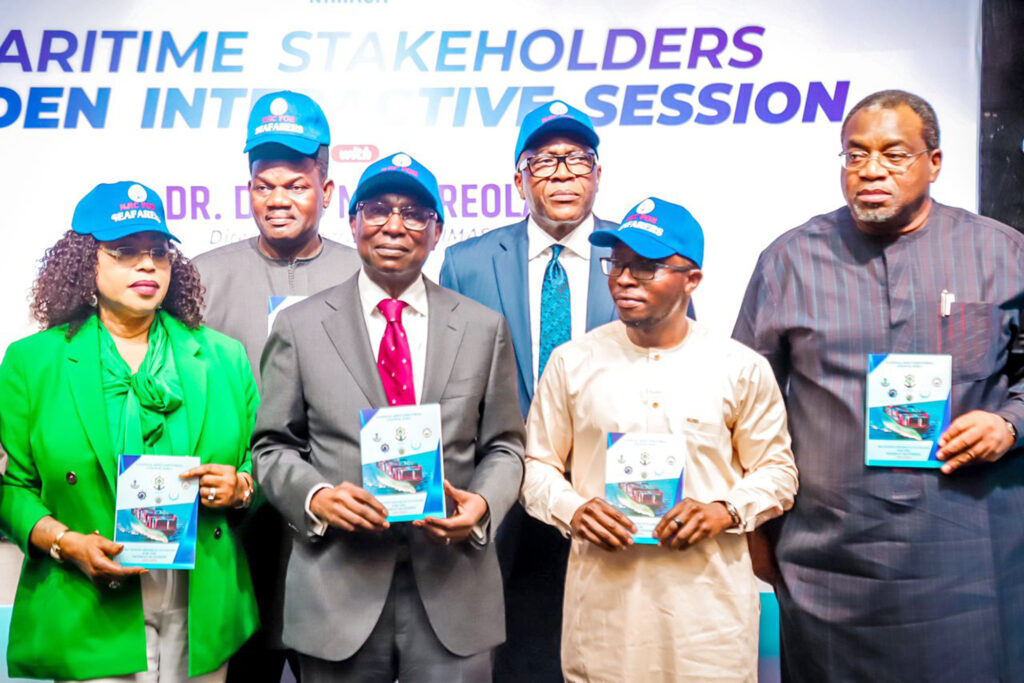
By Patience Chat Moses
Amidst the national controversy on fixing a standard minimum wage rate for civil servants in the country, The Nigerian Maritime Administration and Safety Agency (NIMASA) has launched the reviewed minimum wage document for Nigerian Seafarers, developed in line with the provisions of the Maritime Labour Convention (MLC) 2006. According to a statement issued by Osagie Edward, Assistant Director and Head of Public Relations at NIMASA, the document, which is for 2023-2025, is a product of a Collective Bargaining Agreement that involved employers of labour in the maritime sector, the leadership of the Maritime Workers Union of Nigeria (MWUN), NIMASA and other stakeholders in the industry. Speaking at the luncheon, the Agency’s Director General, Dr. Dayo Mobereola, stressed that the importance of this revised document is to improve working conditions and the welfare of seafarers. He said the review was a significant achievement in the sector’s collective efforts to enhance the seafaring industry adding that it is a landmark document that establishes the benchmark for fair and safe working conditions, decent living wages, and social protection for seafarers.
Dr. Mobereola also emphasized the need for collaboration and swift action in finalizing the Collective Bargaining Agreement (CBA) among Ship Owners, Nigerian Trawlers Operators, Nigerian Merchant Navy Officers and Water Transport Senior Staff Association (NMNO/WTSSA), and Maritime Workers Union of Nigeria (MWUN) on the renewed minimum standards for the Nigerian seafarers, to prevent payment backlogs and ensure timely compensation for employees. He explained that the revised standard provides a comprehensive framework outlining the terms and conditions of employment for maritime workers, including wages, working hours, health and safety regulations, and other benefits.
“This reflects the collective expertise and input of stakeholders and our shared commitment to continuous improvement. This effort will contribute to sustaining an equitable and prosperous maritime labour industry”, he said. The Chairman of the National Seafarers Welfare Board, Alhaji Tijani Ramalan who launched the document, emphasized the need to adhere to the provisions of the Maritime Labour Convention (MLC) 2006, stating that it will not only foster industrial harmony but also guarantee better working conditions for Nigerian Seafarers. The launch event concluded with a call to action for all stakeholders in the maritime industry to collaborate in upholding these minimum standards and building a better future for seafarers, the industry, and the nation.
In another feat, the country’s maritime sector has gotten the United Nations (UN) approval to obtain about 16,300 square kilometres of additional maritime territory. Nigeria submitted to the UN in 2009 through the High Powered Presidential Committee (HPPC) on the country’s extended continental shelf project. Larry Awosika, a marine scientist and member of the committee, told President Bola Tinubu that the approval came after years of meticulous research on geophysics, geology and geography.
He added that diplomacy also helped to solidify Nigeria’s legal rights over a vast expanse of seabed and subsoil beyond its traditional territorial waters. Awosika spoke in Abuja while presenting the approval report alongside other members of the HPPC. The professor said the economic potentials of the newly acquired territory are vast, including increased investments in hydrocarbons, gas, solid minerals, and a wide variety of sedentary species. Aliyu Omar, the Committee’s secretary, said the new approved area “is about 16,300 square kilometres, which is about five times the size of Lagos State”.
Omar added that the official notification of the decision was conveyed to Nigeria by the UN Commission on the Limits of the Continental Shelf (CLCS) in August 2023, shortly after Tinubu assumed office.


